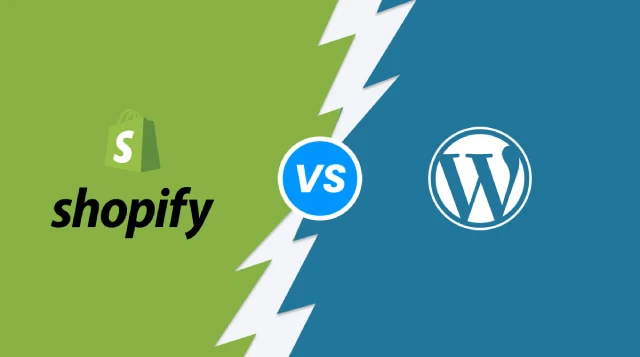Choosing the right e-commerce platform to build and manage your online store is crucial for success. Two popular options that often come up in discussions are Shopify and WordPress. Both platforms offer unique features and advantages, but understanding their differences is essential to make an informed decision. Let’s compare Shopify vs. WordPress, examining their key features, ease of use, customization capabilities, scalability, and pricing, to help you determine which platform best suits your needs.
Ease of Use:
Shopify is renowned for its user-friendly interface, making it an ideal choice for beginners. It provides a fully hosted solution, meaning you don’t have to worry about managing hosting or technical aspects. Shopify offers an intuitive drag-and-drop builder, making it easy to create and customize your store without any coding knowledge.
WordPress is a versatile content management system that can be used for various purposes, including e-commerce. While it offers more flexibility, setting up an online store with WordPress requires additional steps. You need to install and configure an e-commerce plugin like WooCommerce to add the necessary functionality. Although WordPress has a steeper learning curve, it offers more control and customization options.
Customization:
Shopify offers a wide range of beautifully designed themes, both free and premium, allowing you to create a visually appealing store. While customization options are available, they are limited compared to WordPress. You can modify colors, fonts, and layouts, but extensive customization may require knowledge of Shopify’s proprietary Liquid programming language.
WordPress excels in customization capabilities. With thousands of themes and plugins, including WooCommerce, you can personalize your online store to match your brand’s unique requirements. WordPress offers greater control over design elements, and if you have coding expertise, you can customize every aspect of your store to create a truly unique experience.
Scalability:
Shopify is designed to handle stores of all sizes, from small businesses to enterprise-level operations. It offers robust scalability, ensuring that your store can handle high traffic and sales volumes without compromising performance. Shopify takes care of hosting, security, and server maintenance, allowing you to focus on growing your business.
WordPress: With the right hosting provider and optimization, WordPress can handle large-scale e-commerce stores. However, as your store grows, you might need to invest more time and effort into managing server resources and optimizing performance. The scalability of WordPress largely depends on the hosting solution you choose.
App and Plugin Ecosystem:
Shopify boasts a vast app store offering a wide range of plugins and integrations to enhance your store’s functionality. From marketing and SEO tools to inventory management and customer support, Shopify’s app ecosystem is well-developed, simplifying the process of expanding your store’s capabilities.
The WordPress plugin directory provides an extensive library of plugins, including WooCommerce, which can transform your website into a feature-rich online store. The plugin ecosystem allows you to integrate with various payment gateways, add advanced analytics, and leverage other essential e-commerce tools. However, the quality and compatibility of plugins can vary, requiring careful selection and testing.
Pricing:
Shopify operates on a subscription-based pricing model, with plans starting from basic to advanced features. The cost includes hosting, security, and support. While Shopify’s pricing may seem higher compared to WordPress initially, it covers essential aspects, eliminating the need to manage these services separately.
WordPress itself is free to use, but additional costs arise from hosting, domain registration, and premium themes or plugins. The pricing depends on the hosting provider and the specific extensions you choose. WordPress offers more budget-friendly options, particularly for small businesses, but the total cost can increase as you add more advanced features.
Choosing between Shopify and WordPress ultimately comes down to your specific requirements and technical expertise. Shopify offers a user-friendly experience, comprehensive features, and hassle-free maintenance, making it an excellent choice for beginners and those looking for simplicity. On the other hand, WordPress provides greater customization options, scalability, and flexibility for those with more technical skills. Contact us today to discuss building a website that aligns with your e-commerce aspirations.
